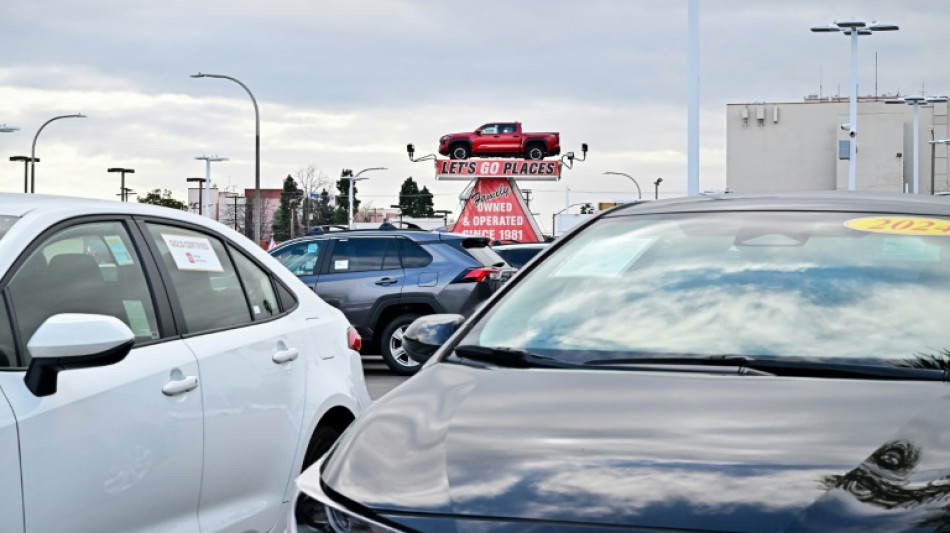
-
 Man Utd 'on right track' despite 13th Premier League defeat: Dalot
Man Utd 'on right track' despite 13th Premier League defeat: Dalot
-
Israel says expanding Gaza offensive to seize 'large areas'

-
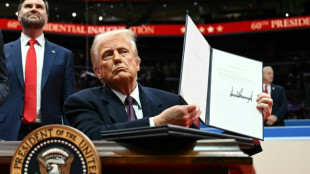 Certain foreign firms must 'self-certify' with Trump diversity rules: US embassies
Certain foreign firms must 'self-certify' with Trump diversity rules: US embassies
-
Deutsche Bank asset manager DWS fined 25 mn euros for 'greenwashing'

-
 UK drawing up new action plan to tackle rising TB
UK drawing up new action plan to tackle rising TB
-
Nigerian president sacks board of state oil company
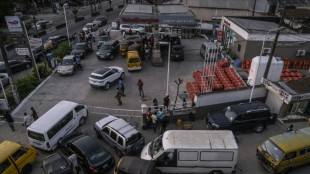
-
 Barca never had financial room to register Olmo: La Liga
Barca never had financial room to register Olmo: La Liga
-
Spain prosecutors to appeal ruling overturning Alves' rape conviction

-
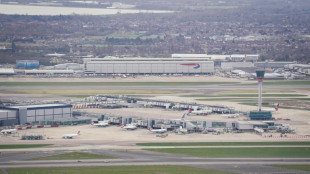 Heathrow 'warned about power supply' days before shutdown
Heathrow 'warned about power supply' days before shutdown
-
Epstein accuser Virginia Giuffre 'stable' after car crash

-
 Myanmar quake survivors plead for more help
Myanmar quake survivors plead for more help
-
Greece to spend 25 bn euros in 'drastic' defence overhaul: PM

-
 Maresca non-committal over Sancho's future at Chelsea
Maresca non-committal over Sancho's future at Chelsea
-
WHO facing $2.5-bn gap even after slashing budget: report

-
 Real Madrid coach Ancelotti tells tax trial did not seek to defraud
Real Madrid coach Ancelotti tells tax trial did not seek to defraud
-
Chinese tourists pine for Taiwan's return as Beijing jets surround island
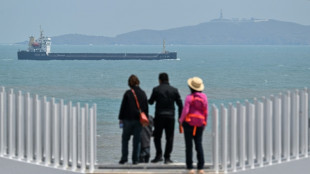
-
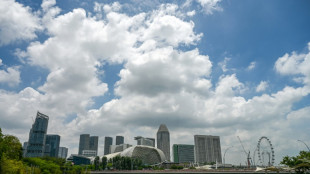 Singapore detains teenage boy allegedly planning to kill Muslims
Singapore detains teenage boy allegedly planning to kill Muslims
-
What is the 'Qatargate' scandal roiling Israel?

-
 AI coming for anime but Ghibli's Miyazaki irreplaceable, son says
AI coming for anime but Ghibli's Miyazaki irreplaceable, son says
-
Swedish insurer drops $160 mn Tesla stake over labour rights
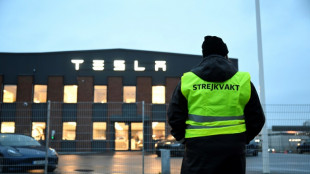
-
 Hunger returns to Gaza as Israeli blockade forces bakeries shut
Hunger returns to Gaza as Israeli blockade forces bakeries shut
-
Rubio heads to Europe as transatlantic tensions soar
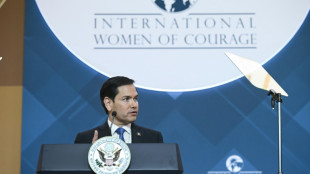
-
 Like 'living in hell': Quake-hit Mandalay monastery clears away rubble
Like 'living in hell': Quake-hit Mandalay monastery clears away rubble
-
'Give me a break': Trump tariffs threaten Japan auto sector
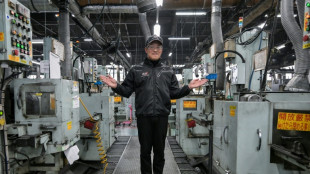
-
 US approves $5.58 bn fighter jet sale to Philippines
US approves $5.58 bn fighter jet sale to Philippines
-
Tsunoda embracing pressure of Red Bull debut at home Japanese GP

-
 'Outstanding' Hay shines as New Zealand seal Pakistan ODI series
'Outstanding' Hay shines as New Zealand seal Pakistan ODI series
-
El Salvador's Bukele flaunts 'iron fist' alliance with Trump
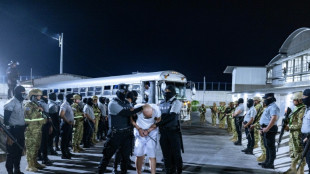
-
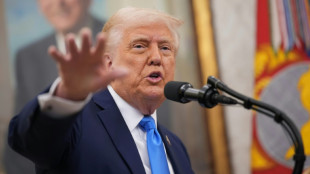 Stock markets mixed as uncertainty rules ahead of Trump tariffs
Stock markets mixed as uncertainty rules ahead of Trump tariffs
-
China probes for key target weak spots with 'paralysing' Taiwan drills
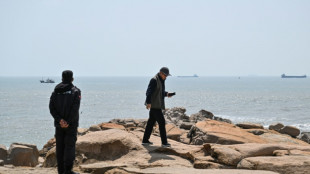
-
 'Top Gun' and Batman star Val Kilmer dies aged 65: New York Times
'Top Gun' and Batman star Val Kilmer dies aged 65: New York Times
-
US lawmakers seek to rename street for Hong Kong's jailed Jimmy Lai
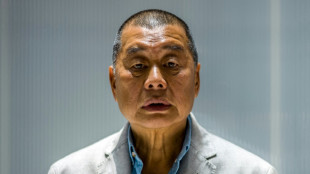
-
 Greece to spend big on 'historic' military shake up
Greece to spend big on 'historic' military shake up
-
Trump faces first electoral setback after Wisconsin Supreme Court vote
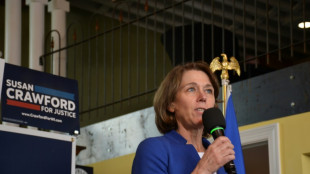
-
 Hay shines as New Zealand beat Pakistan for ODI series win
Hay shines as New Zealand beat Pakistan for ODI series win
-
Israel says expands Gaza offensive to seize 'large areas'

-
 Curry drops 52 as Warriors win, Jokic bags career-high 61 in Denver loss
Curry drops 52 as Warriors win, Jokic bags career-high 61 in Denver loss
-
South Korea mobilising 'all resources' for violence-free Yoon verdict
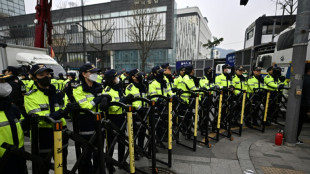
-
 Myanmar quake victim rescued after 5 days as aid calls grow
Myanmar quake victim rescued after 5 days as aid calls grow
-
Real Madrid coach Ancelotti tax fraud trial set to begin
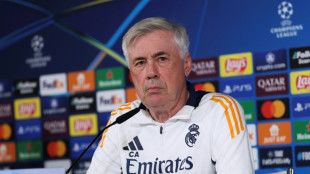
-
 Warner showcases 'Superman' reboot, new DiCaprio film
Warner showcases 'Superman' reboot, new DiCaprio film
-
'Incredible' Curry scores 52 as Warriors down Grizzlies, Bucks edge Suns

-
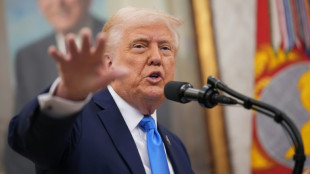 Asian markets edge up but uncertainty rules ahead of Trump tariffs
Asian markets edge up but uncertainty rules ahead of Trump tariffs
-
Nintendo's megahit Switch console: what to know
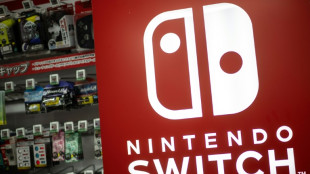
-
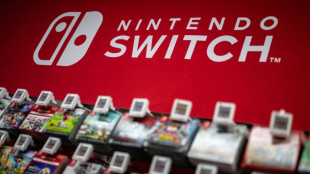 Nintendo to unveil upgrade to best-selling Switch console
Nintendo to unveil upgrade to best-selling Switch console
-
China practises hitting key ports, energy sites in Taiwan drills

-
 Oil, sand and speed: Saudi gearheads take on towering dunes
Oil, sand and speed: Saudi gearheads take on towering dunes
-
All eyes on Tsunoda at Japan GP after ruthless Red Bull move

-
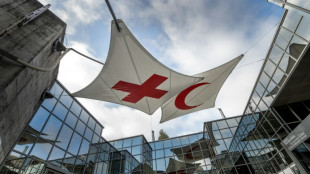 'Image whisperers' bring vision to the blind at Red Cross museum
'Image whisperers' bring vision to the blind at Red Cross museum
-
Hay shines as New Zealand make 292-8 in Pakistan ODI


Carmakers face doubts and jolts over US tariffs
Raise prices or cut into their margins, open or close factories: carmakers must soon make major decisions as the United States imposes stiff tariffs on imported vehicles.
The 25-percent tariffs that the administration of President Donald Trump is imposing as of April 3 will apply to cars and car parts not manufactured in the United States.
But all carmakers will be impacted, as even US automakers import foreign parts and manufacture vehicles for the US market in neighbouring Canada and Mexico.
The Bank of America estimates that the tariffs will apply to 7.3 million vehicles, or eight percent of global sales, and will expose carmakers to added costs and chaos.
- Taking stock -
One, albeit temporary, strategy to cope with the new tariffs is to avoid them by shipping as many vehicles as possible to the United States before they come into force.
"Shipments have expanded quite a bit to absorb the first shock" of the tariffs, said Fitch Ratings Director Cigdem Cerit.
"Everyone did build a little buffer," she added.
South Korea's Hyundai was among the automakers that most built up its stock of cars, according to Cox Automotive, an automotive services firm. Meanwhile, Stellantis ate into its ample stocks that had weighed on results in previous quarters.
But the stocks will likely last no more than a few weeks, especially if Americans rush to dealers to snap up any remaining deals.
"After an initial, short surge in buying, we expect vehicle sales to fall, new and used prices to increase, and some models to be eliminated if tariffs persist," said Jonathan Smoke, chief economist at Cox Automotive.
- Sticker shock -
It is an open question about how much car prices will rise and to what extent sales will fall.
The Bank of America estimates that US vehicle prices would rise by approximately $10,000 if manufacturers fully pass on the cost of tariffs and maintain their profit margins.
"However, we don't expect consumers would absorb the price increase in full," said analysts at the bank.
Carmakers "are more likely to sell vehicles at breakeven until they rebalance the production footprint," it said, estimating that US consumers would see price hikes of around $4,500.
Mid-range imported vehicles are likely to feel the pinch, such as the Chevrolet Silverado pick-up and the Toyota Rav4 SUV.
But even manufacturers like Porsche could have trouble passing on the cost of tariffs on low-end models like its Macan SUV, said Fitch's Cerit.
Ferrari was the first carmaker to announce a hike in prices -- as much as 10 percent -- on vehicles sold in the United States, its top market.
A major question is whether consumers continue to buy the same vehicles at a higher price, said Deloitte auto analyst Guillaume Crunelle.
He believes that is unlikely as "people buy in the price bracket that corresponds with their means".
- Made in the USA -
Donald Trump has stated that the goal of the tariffs is to encourage manufacturing jobs to return to the United States, but it is unclear whether that will be achieved.
Crunelle said companies will ask themselves: "Is it more competitive to manufacture in the United States, with a weaker market, or to pay customs duties?"
US manufacturers are still hoping that tariffs will be reduced on vehicles imported from Canada and Mexico, where they have numerous factories.
"Manufacturers have need for certainty," said automotive sector analyst Sebastien Amichi at the consulting firm Kearney.
Hyundai and Stellantis have announced the opening or reopening of factories since Trump's November re-election.
But such moves take time: up to several years to bring a factory online. And suppliers, which are also in a weak position due to the switch to electric vehicles, must also follow manufacturers.
European and Japanese carmakers that play Trump's game face a double cost according to Deloitte's Crunelle: in addition to building new factories they have to pay the costs of laying off workforces at home.
Some may refuse to have their arms twisted into manufacturing in the United States.
"I'll bet that certain manufacturers will prefer to reduce their production costs" at home rather than set up in the United States, Crunelle said.
Ch.Havering--AMWN